The Twilight Zone: Season 1 Blu-ray Movie
HomeThe Twilight Zone: Season 1 Blu-ray Movie 
Image Entertainment | 1959-1960 | 930 min | Rated TV-PG | Sep 14, 2010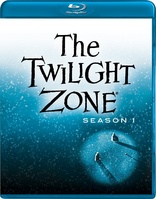
Movie rating
9.1 | / 10 |
Blu-ray rating
| Users | 4.8 | |
| Reviewer | 5.0 | |
| Overall | 4.8 |
Overview
The Twilight Zone: Season 1 (1959-1960)
The complete first season of Rod Serling's classic, groundbreaking series exploring the fantastic and the frightening.
Starring: Jack Klugman, William Shatner, Robert Redford, William Windom, Cliff RobertsonDirector: John Brahm, Douglas Heyes, Buzz Kulik, Lamont Johnson (I), Richard L. Bare
| Horror | Uncertain |
| Psychological thriller | Uncertain |
| Supernatural | Uncertain |
| Mystery | Uncertain |
| Sci-Fi | Uncertain |
| Thriller | Uncertain |
Specifications
Video
Video codec: MPEG-4 AVC
Video resolution: 1080p
Aspect ratio: 1.33:1
Original aspect ratio: 1.33:1
Audio
English: LPCM 2.0 Mono (48kHz, 16-bit)
English: LPCM 2.0 Mono (48kHz, 16-bit)
1st 2.0 Mono is Remastered Audio, 2nd is Original Audio
Subtitles
English SDH
Discs
50GB Blu-ray Disc
Five-disc set (5 BDs)
Packaging
Slipcover in original pressing
Playback
Region A (locked)
Review
Rating summary
| Movie | 5.0 | |
| Video | 4.5 | |
| Audio | 4.5 | |
| Extras | 4.5 | |
| Overall | 5.0 |
The Twilight Zone: Season 1 Blu-ray Movie Review
Something wicked this way comes…
Reviewed by Casey Broadwater September 8, 2010“There is a fifth dimension beyond that which is known to man. It is a dimension as vast as space and as
timeless as infinity. It is the middle ground between light and shadow, between science and superstition, and it lies
between the pit of man’s fears and the summit of his knowledge. This is the dimension of imagination. It is an area
which we call…The Twilight Zone.”
Fantastical. Extraordinary. Vaguely ominous. Creator/showrunner Rod Serling’s opening narration says it all. The
Twilight Zone—which ran for five seasons between 1959 and 1964—was to be something wholly unique in the
then-short history of television: a program aimed squarely at adults that would explore the realms of science fiction
and fantasy, supposedly juvenile genres that were typically seen as the province of kid’s comic books. For a hotshot
like Serling—who was one of TV’s top writers of high-minded dramas—The Twilight Zone initially seemed like
a diversion, a potential career misstep. Journalist Mike Wallace, noting in a 1959 interview that Serling seemed to be
putting all of his creative energy into The Twilight Zone, even had the gall to ask, “You’ve given up on
writing anything serious for television, right?” It was only later that critics would realize just how
subversively serious The Twilight Zone actually was. For all of its genre thrills—and the show is still more
unsettling than most of what passes for horror these days—The Twilight Zone was Serling’s way of skirting
TV censors, using the guise of seemingly innocuous sci-fi stories to broach then-unacceptable topics like racism and
McCarthyism. It’s the social commentary equivalent of slipping booze into the punch at the school dance, and this sly
mix of chills and cultural criticism is the reason The Twilight Zone is so smart, scary, and compulsively
watchable.
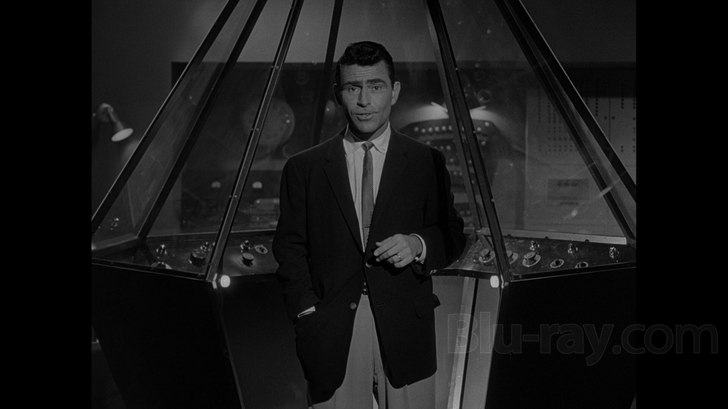
Rod Serling presents...
Imagine, if you will, the black hole that would be left in the history of television if The Twilight Zone had never existed. Not only would we be missing the most enigmatic, influential series to ever be beamed into living rooms, but all of the show’s myriad descendents would disappear into the void as well. Without The Twilight Zone’s pioneering exploration of the supernatural and surreal, the inexplicable and occult, there would almost certainly be no X-Files, no Lost, no Fringe—the most recently memorable crop of so-called mystery shows. The Twilight Zone also helped create what might be called “auteur television,” the idea that a program could be produced from the creative vision of a singular showrunner. The X-Files’ Chris Carter, J.J. Abrams of Fringe and numerous other TV ventures, Mad Men’s Matt Weiner, and Lost’s Carlton Cuse and Damon Lindelof—who are so of one mind fans call them by the portmanteau Darlton—all owe a debt to the work of Rod Serling, who not only oversaw The Twilight Zone’s overall direction, but personally wrote an astounding 92 of the series’ 156 episodes. Serling clearly knew what he wanted the series to accomplish, and beyond tantalizing us with horrific what if scenarios—which he did extremely well—he also wanted to say something about the mid-century state of the world. Where Matt Weiner uses the 1960s setting of Mad Men to comment on how far or little we’ve come in the intervening years, Serling held a mirror to his own era, using sci-fi and fantasy tropes to indirectly discuss the hot-button issues of the day—from Cold War paranoia and the possibility of atomic obliteration, to the civil rights movement and rapidly shifting American morality.
The half-hour episodes—each a standalone tale—are unapologetically formulaic, but Serling settled on the perfect formula, borrowing his narrative style from short story masters like O. Henry and Guy de Maupassant. Almost without exception, each episode opens with Serling, in voice-over narration, introducing a mystery—Death coming to visit a salesman, a WWI biplane landing on a modern day runway, a lieutenant who knows instinctively which of his soldiers will die in battle. What follows is a slow fuse-like burn—sometimes terrifying, sometimes merely curious—that leads to a bomb of a twist ending that, when it finally explodes, completely destroys our preconceived conceptions about what we’ve been watching and casts the story’s themes in a new light. (If you want to know where M. Night Shyamalan got the ending for The Sixth Sense, you’ll find it mid-way through season one. I won’t say which episode; it would spoil the fun.) Once you’ve seen enough episodes, the game quickly becomes “guess the twist ending,” but even when you see what’s coming—and most often, you won’t—the stories are engaging, well-written, and frequently philosophically loaded. When Serling wasn’t penning the episodes himself, he often passed off writing duties to well-respected genre authors like Richard Matheson (I Am Legend) and Charles Beaumont, who both shared Serling’s cultural criticism masked as fantasy aesthetic.
Although there are classic episodes spread across each of the show’s five seasons, season one has several of the most memorable. The opener, “Where is Everybody?,” sets an immediately off-kilter tone. Here, a man finds himself wandering through a strangely deserted town, growing increasingly paranoid that he’s being watched. When the twist comes—and, once again, you’ll find no real spoilers here—the episode reveals itself as a commentary on man’s need for companionship, the perils of an overactive imagination, and, oddly enough, the difficulties that isolated astronauts may experience in the nascent 1960s space race. Isolation becomes a common theme. “The Lonely” is about a convicted murderer who is sent to live out his life sentence on a distant asteroid. “I Shot an Arrow into the Air” explores group dynamics when the crew of the world’s first manned space mission crashes on what they assume to be an uninhabited planet. And in what may be the series’ most famous episode, “Time Enough at Last,” a sudden nuclear holocaust leaves a bookworm—played by Burgess Meredith—alone with all the time in the world to read his precious novels. (The devastating ending subtly points out that time, without purpose, is torture.)
The Twilight Zone is such a product of its milieu—borne out of the second Red Scare, hydrogen bomb testing, the Korean War, and the space race—but it’s amazing how universal the show’s themes are, and how relevant to our own times. Take the episode “The Monsters Are Due on Maple Street,” in which the residents of a sleepy neighborhood spiral into a conspiratorial tizzy when they begin to suspect one another of being aliens. This is clearly an allegory for Cold War paranoia, the witch-hunt mentality of McCarthyism, and the possibility that America could destroy itself from within, but you could easily transplant this episode into the present day and have it reflect current attitudes about the fear of terrorism or even the increasing frenzy over illegal immigration. (The episode was remade in 2003 as part of UPN’s short-lived Twilight Zone re-boot, and indeed, terrorism was the substitute for communism.)
There’s definitely a cynical, pessimistic side to The Twilight Zone—although this isn’t a criticism, just a statement of the show’s slightly misanthropic philosophical bent. Many of the episodes end tragically, with the characters unable to overcome their weaknesses, moral or otherwise, and Serling seems unconvinced that “progress” is necessarily good for humanity. (There are no less than six astronaut/space-themed episodes in season one, and they all end in disaster.) This leads to a common theme of wistfulness for simpler times—most apparent in the achingly beautiful “Walking Distance” and the dream-like “A Stop At Willoughby,” two of the season’s very best episodes. At the same time, this sense of nostalgia—which holds out hope that people could be better if they weren’t so harried by work, family, and the existential worries of the 20th century—is contrasted against the harsh reality that you can never go back, that time and technology move inexorably forward. And that conundrum is the essence of The Twilight Zone; not only is it the “middle ground between light and shadow, between science and superstition,” the show also explores that netherworld between hope and reality, between the way we see ourselves as a society and the way we actually are. That it can be so reflective and insightful while keeping us on the edges of our seats is the ultimate answer to the mystery of why we’re still watching The Twilight Zone some fifty years after it first aired.
Season One Episodes:
1. Where is Everybody?
2. One for the Angels
3. Mr. Denton on Doomsday
4. The Sixteen Millimeter Shrine
5. Walking Distance
6. Escape Clause
7. The Lonely
8. Time Enough At Last
9. Perchance to Dream
10. Judgment Night
11. And When the Sky Was Opened
12. What You Need
13. The Four of Us Are Dying
14. Third from the Sun
15. I Shot an Arrow into the Air
16. The Hitch-Hiker
17. The Fever
18. The Last Flight
19. The Purple Testament
20. Elegy
21. Mirror Image
22. The Monsters Are Due on Maple Street
23. A World of Difference
24. Long Live Walter Jameson
25. People Are Alike All Over
26. Execution
27. The Big Tall Wish
28. A Nice Place to Visit
29. Nightmare as a Child
30. A Stop at Willoughby
31. The Chaser
32. A Passage for Trumpet
33. Mr. Bevis
34. The After Hours
35. The Mighty Casey
36. A World of His Own
The Twilight Zone: Season 1 Blu-ray Movie, Video Quality 
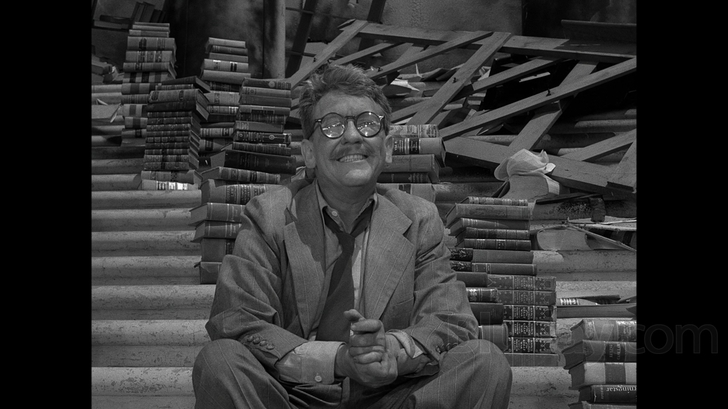
In a word: beautiful. Image Entertainment has gone back to The Twilight Zone's original camera negatives to make 1080p/AVC-encoded transfers—framed in the original TV 1.33:1 aspect ratio—that are sharp, surprisingly clean, and completely free of unnecessary tampering or tinkering. The prints are very nearly free of debris; you'll see small, white, barely noticeable flecks in each episode, but there are no major scratches or stains. Perhaps the greatest sigh of relief is that the series' gorgeous black and white cinematography is completely intact, with rich cinematic grain, no DNR scrubbing, and no overt edge enhancement. This hands-off approach extends to the monochromatic color gradation, which doesn't appear to have received any excess boosting, but has a naturally dense contrast with deep blacks, crisp whites, and no significant loss of detail in shadows or highlights. Any brightness flickering that occurs is mild and infrequent, and aside from a few instance of minor banding—most notably in the darker segments of "Perchance to Dream"—I didn't spot any compression-related distractions. Of course, the greatest boon to having The Twilight Zone in high definition is the dramatic increase in clarity. If you've been watching the series through all its iterations —TV re-runs, smeary VHS copies, okay-but-not-amazing DVDs—you'll be momentarily stunned by how great the show looks on Blu-ray. From tweed suits and the inner mechanisms of a female robot to prop details and facial features, the upgrade in resolution is immediately and appreciably apparent. The sense of depth and, for a lack of a better phrase, the visual poetry of the 35mm image, is simply fantastic. It's hard to imagine The Twilight Zone looking any better than this.
The Twilight Zone: Season 1 Blu-ray Movie, Audio Quality 
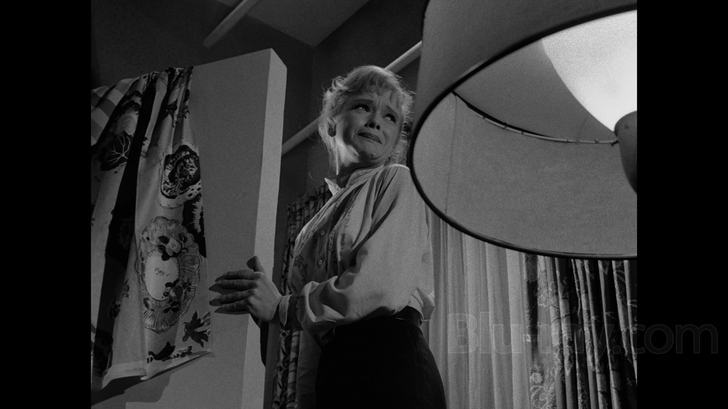
Image has provided each episode of the season with two Linear PCM mono mixes, both harvested from the series' original magnetic soundtracks. The episodes default to restored and remastered mixes that reveal newfound dynamic depth and clarity. Of course, only so much can—and should—be done with the mono source material, and rather than trying to expand the presentation to 5.1 channels or add new sound effects, Image has wisely opted to simply clean up the tracks. The remaster's most notable traits are tape hiss reduction, clearer dialogue, and brighter, tighter tones. Many of the episodes feature fantastic scores—from the likes of Bernard Herrmann, Van Cleave, and Jerry Goldsmith—and the music sounds wonderful here, with surprising projection and presence. For comparison, purists can also select the original unrestored audio, which, as expected, is slightly dirtier, with more muffled voices and a persistent hiss. I definitely prefer the remastered mix, but it's commendable that Image thought to include both tracks. Plus, unlike the DVDs, each episode here includes easy-to-read English subtitles. I have no complaints.
The Twilight Zone: Season 1 Blu-ray Movie, Special Features and Extras 
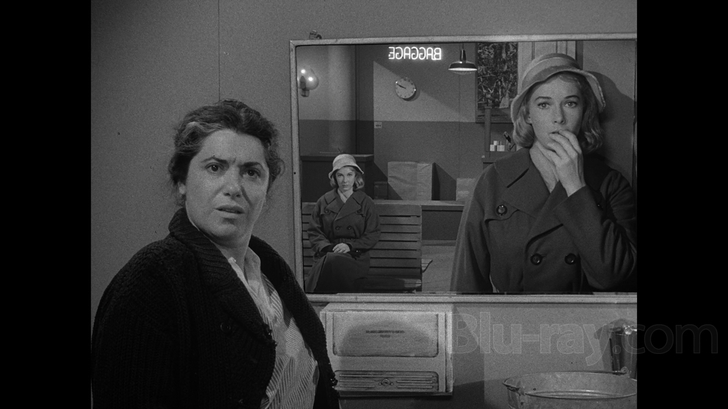
Audio Commentaries
Image Entertainment has assembled all-new, full-length commentary tracks for no less than nineteen
episodes of season one—a few episodes even feature multiple commentaries—with input from The Twilight Zone
Companion author Marc Scott Zicree, film historian Gary Gerani (Fantastic Television), music historians
Steven C. Smith, John Morgan, and William T. Stromberg, writer/producer David Simkins (Lois & Clark,
Dark Angel), writer Mark Fergus (Children of Men, Iron Man), actor William Reynolds, and
director Ted Post. Other tracks feature actors Earl Holliman, Martin Landau, Rod Taylor, Martin Milner, Kevin McCarthy,
and CBS executive William Self. There's just an incredibly bounty of Twilight Zone goodness here, from
obscure trivia and personal reminiscences to insightful discussions on the series' edge-of-your-seat narrative style and
extremely timely themes. The tracks by Marc Scott Zicree and Gary Gerani are especially informative, as these guys
are bonafide TZ experts.
Isolated Musical Scores
Thirty-four of the episodes include full-length isolated musical scores—in Dolby Digital 2.0—featuring compositions
from legends like Bernard Herrmann, Jerry Goldsmith, and others.
Westinghouse Desilu Playhouse: "The Time Element" (1080p, 54:52)
This is a biggie! "The Time Element" is the never-before-released-on-home-video original "unofficial" pilot episode for
The Twilight Zone, which aired on Desi Arnaz and Lucille Ball's Westinghouse Desilu Playhouse drama
anthology series. The Rod Serling-penned episode is about a man who may or may not be skipping back in time to the
events leading up to the attack on Pearl Harbor. Includes optional commentary by Marc Scott Zicree, and an alternate
opening and closing from the syndicated version of the episode.
Original Unaired Pilot Version of "Where is Everybody?" (SD, 34:44)
Includes a clever pitch to sponsors from Rod Serling, optional commentary by CBS exec William Self, and alternate
opening and closing narrations.
Tales of Tomorrow: "What You Need" (SD, 29:29)
Tales of Tomorrow, a sci-fi anthology show that ran on ABC from 1951-1953, was a kind of predecessor to
The Twilight Zone. Here we get to see the Tales version of "What You Need"—based on a Henry Kuttler story
—which differs quite differently from the Twilight Zone episode.
Radio Dramas
The Twilight Zone Radio Dramas is a syndicated radio show—launched in 2002—that retells classic TZ
episodes with slight modifications for contemporary audiences. Eighteen 45-minute broadcasts are included here, and
when selected, the audio plays over a single still from the episode that was adapted.
Rod Serling Promos (1080p)
At the conclusion of each episode, Rod Serling gives a quick tease for what viewers can expect next week.
Rod Serling Lectures at Sherwood Oaks College
Four of the episodes—the pilot version of "Where is Everybody," "Walking Distance," "And When the Sky Was
Opened," and "The Mighty Casey"—can be watched with audio from a series of lectures Rod Serling delivered at
Sherwood Oaks College. Most of the discussion is episode specific, so these are just as good as having commentary
tracks by Serling himself!
Marc Scott Zicree Interviews
Audio-only tapes from The Twilight Zone Companion author Marc Scott Zicree, who interviewed actors
Burgess Meredith and Anne Francis, directors Douglas Heyes and Richard L. Bare, producer Buck Houghton, and writer
Richard Matheson in 1978. Disc five also includes part one of an extensive interview with cinematographer George T.
Clemens. Part two is presumably coming on the season two set.
Additional Interviews (SD)
Brief video interviews with actors Dana Dillaway, Suzanne Lloyd, Beverly Garland, and Ron Masak.
Sponsor Billboards (1080p)
View four vintage, 15-second bumper ads for the likes of Kleenex and Sanka Coffee.
Emmy Awards (1080p, 3:10)
Clips of Rod Serling graciously accepted various Emmy Awards.
Syndication Promos (1080p)
Two 30-second syndication promos for "A Stop at Willoughby" and "The After Hours" that aired in 1977.
The Twilight Zone: Season 1 Blu-ray Movie, Overall Score and Recommendation 
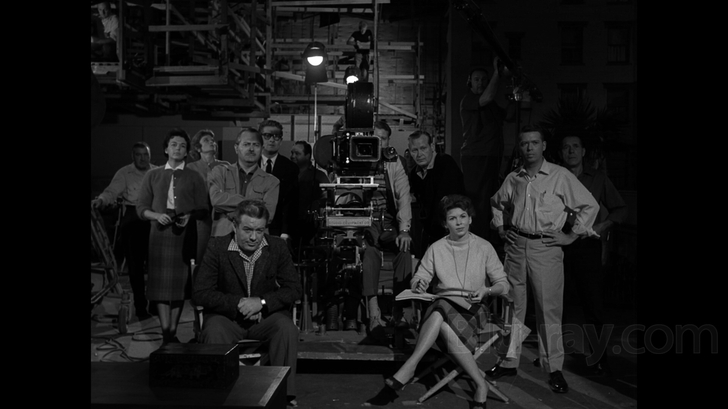
I can't tell you how happy I am with this set. Not only do we get all 36 episodes of the first season of the immensely influential Twilight Zone remastered in beautiful high definition with uncompressed audio, but the five-disc set also includes a Thanksgiving-sized cornucopia of bonus material goodness, from expert commentaries, vintage interviews, and radio dramas, to Rod Serling lectures and—perhaps best of all—the show's original "unofficial" pilot episode, "The Time Element," being released here for the first time on home video in the U.S. If you love television, science fiction, fantasy, horror, time travel, Cold War craziness, snappy twist endings, the realm of the unknown, or all of the above, this is an absolute must-have release. It's also a definite contender for my year-end top-10 list. Bring on season two!
Other editions
The Twilight Zone: Other Seasons

The Twilight Zone: Fan Favorites
1959-1964

The Twilight Zone: Fan Favorites
1959-1964

The Twilight Zone: Season 1
1959-1960

The Twilight Zone: Season 2
1960-1961

The Twilight Zone: Season 2
1960-1961

The Twilight Zone: Season 3
1961-1962

The Twilight Zone: Season 3
1961-1962

The Twilight Zone: Season 4
1963

The Twilight Zone: Season 4
1962-1963

The Twilight Zone: Season 5
1963-1964

The Twilight Zone: Season 5
1963-1964
Similar titles
Similar titles you might also like

Event Horizon 4K
1997

The Cloverfield Paradox
2018

Supernova
2000

The Last Days on Mars
2013

Vivarium
2019

Pandorum
2009

Triangle
2009

The Thing
2011

Jason X 4K
Limited Edition
2001

The X-Files: Season 5
1997-1998

Night Gallery: Season Two
1971-1972

The War of the Worlds 4K
70th Anniversary
1953

The Thing from Another World
Warner Archive Collection
1951

Lifeforce
1985

It! The Terror from Beyond Space
2K Restoration
1958

Invaders from Mars 4K
Standard Edition
1953

Horror of the Blood Monsters
Space Mission to the Lost Planet / Vampire Men of the Lost Planet
1970

Queen of Blood
1966

The Creep Behind the Camera / The Creeping Terror
1964

Plaguers
10th Anniversary Special Edition
2008